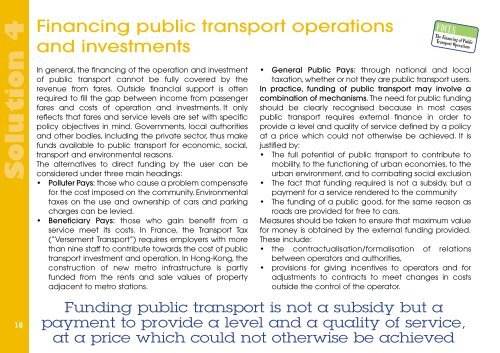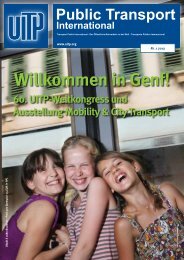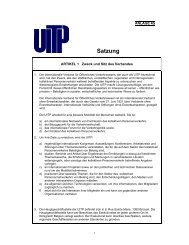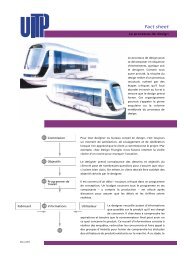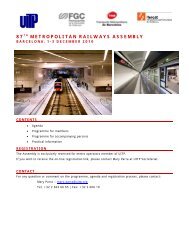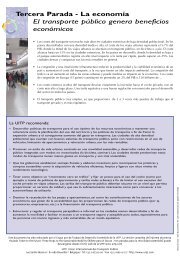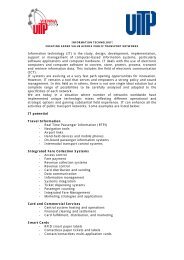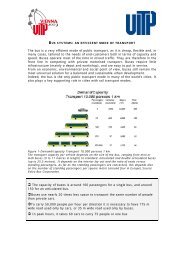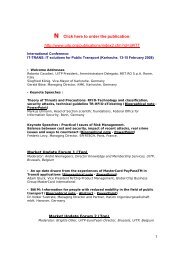Problems Solutions Good Practices - UITP
Problems Solutions Good Practices - UITP
Problems Solutions Good Practices - UITP
Create successful ePaper yourself
Turn your PDF publications into a flip-book with our unique Google optimized e-Paper software.
Solution 4<br />
18<br />
Financing public transport operations<br />
and investments<br />
In general, the financing of the operation and investment<br />
of public transport cannot be fully covered by the<br />
revenue from fares. Outside financial support is often<br />
required to fill the gap between income from passenger<br />
fares and costs of operation and investments. It only<br />
reflects that fares and service levels are set with specific<br />
policy objectives in mind. Governments, local authorities<br />
and other bodies, including the private sector, thus make<br />
funds available to public transport for economic, social,<br />
transport and environmental reasons.<br />
The alternatives to direct funding by the user can be<br />
considered under three main headings:<br />
• Polluter Pays: those who cause a problem compensate<br />
for the cost imposed on the community. Environmental<br />
taxes on the use and ownership of cars and parking<br />
charges can be levied.<br />
• Beneficiary Pays: those who gain benefit from a<br />
service meet its costs. In France, the Transport Tax<br />
(“Versement Transport”) requires employers with more<br />
than nine staff to contribute towards the cost of public<br />
transport investment and operation. In Hong-Kong, the<br />
construction of new metro infrastructure is partly<br />
funded from the rents and sale values of property<br />
adjacent to metro stations.<br />
The Financing of Public<br />
Transport Operations<br />
• General Public Pays: through national and local<br />
taxation, whether or not they are public transport users.<br />
In practice, funding of public transport may involve a<br />
combination of mechanisms. The need for public funding<br />
should be clearly recognised because in most cases<br />
public transport requires external finance in order to<br />
provide a level and quality of service defined by a policy<br />
at a price which could not otherwise be achieved. It is<br />
justified by:<br />
• The full potential of public transport to contribute to<br />
mobility, to the functioning of urban economies, to the<br />
urban environment, and to combating social exclusion<br />
• The fact that funding required is not a subsidy, but a<br />
payment for a service rendered to the community<br />
• The funding of a public good, for the same reason as<br />
roads are provided for free to cars.<br />
Measures should be taken to ensure that maximum value<br />
for money is obtained by the external funding provided.<br />
These include:<br />
• the contractualisation/formalisation of relations<br />
between operators and authorities,<br />
• provisions for giving incentives to operators and for<br />
adjustments to contracts to meet changes in costs<br />
outside the control of the operator.<br />
Funding public transport is not a subsidy but a<br />
payment to provide a level and a quality of service,<br />
at a price which could not otherwise be achieved


